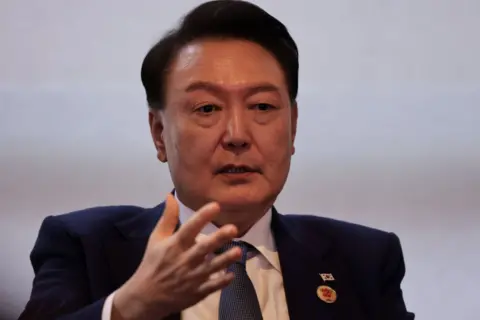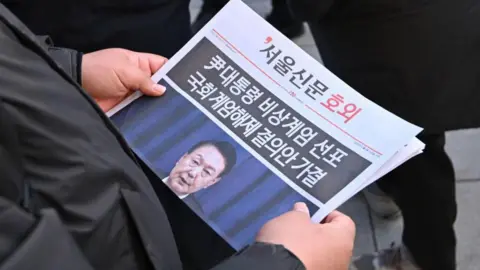Yoon Suk Yeol: South Korea's scandal-hit leader who declared ...
Getty Images
The South Korean president's declaration of martial law came as a surprise to South Koreans and the rest of the world

South Korean President Yoon Suk Yeol’s future is hanging in the balance after a chaotic night during which he dramatically declared martial law and then withdrew it just as suddenly, plunging the country into turmoil.
Yoon, who won the top job by a whisker in 2022, was already deeply unpopular and under growing pressure since losing parliamentary elections in April, regarded as a vote of confidence on his time in office.
He’s been plagued by personal problems too. Last month he apologised in a televised address to the nation for a string of controversies surrounding his wife that included allegedly accepting a luxury Dior handbag and stock manipulation.
Now he’s facing demands that he resign and lawmakers have said they will move to impeach him.
Tuesday night’s short-lived attempt to impose martial law took everyone by surprise.
It sent lawmakers scrambling to the National Assembly in Seoul to vote against the order. Outside, police had assembled as thousands of protesters gathered in fury.
The same crowd erupted in cheers when Yoon backtracked within hours and declared he would withdraw the martial law order.
That he would play such a high-stakes game, and then back off so easily, came as a surprise to South Koreans and the rest of the world.
Rise to power
Yoon was a relative newcomer to politics when he won the presidency. He had risen to national prominence for prosecuting the corruption case against disgraced former President Park Geun-hye in 2016.
In 2022, the political novice narrowly beat his liberal opponent Lee Jae-myung by less than 1% of the vote - the closest result the country has seen since direct elections started to be held in 1987.
At a time when South Korean society was grappling with widening divisions over gender issues, Yoon appealed to young male voters by running on an anti-feminism platform.
People had “high hopes” for Yoon when he was elected, said Don S Lee, associate professor of public administration at Sungkyunkwan University. “Those who voted for Yoon believed that a new government under Yoon will pursue such values as principle, transparency and efficiency.”

Yoon has also championed a hawkish stance on North Korea. The communist state was cited by Yoon on Tuesday night when he tried to impose martial law.
He said he needed to protect against North Korean forces and “eliminate anti-state elements”, even though it was apparent from the outset that his announcement was less about the threat from the North and more about his domestic woes.
Yoon is known for gaffes, which haven’t helped his ratings. During his 2022 campaign he had to walk back a comment that authoritarian president Chun Doo-hwan, who declared martial law and was responsible for massacring protestors in 1980, had been "good at politics".
Later that year he was forced to deny insulting the US Congress in remarks made after meeting US President Joe Biden in New York.
He was caught on a hot mic and seen on camera seemingly calling US lawmakers a Korean word that can be translated as "idiots" or something much stronger. The footage quickly went viral in South Korea.
Yoon has had some success in foreign policy, notably improving ties in his country's historically fraught relationship with Japan.
‘Political miscalculation’
Yoon’s presidency has been mired in scandal. Much of it centred around his wife Kim Keon Hee, who was accused of corruption and influence peddling - most notably allegedly accepting a Dior bag from a pastor.
In November, Yoon apologised on behalf of his wife while rejecting calls for an investigation into her activities.
But his presidential popularity remained wobbly. In early November, his approval ratings tumbled to 17%, a record low since he took office.
In April, the opposition Democratic Party won the parliamentary election by a landslide, dealing a crushing defeat for Yoon and his People Power Party.
Yoon was relegated to a lame duck president and reduced to vetoing bills passed by the opposition, a tactic that he used with “unprecedented frequency”, said Celeste Arrington, director of The George Washington University Institute for Korean Studies.

This week, the opposition slashed the budget the government and ruling party had put forward - and the budget bill cannot be vetoed.
Around the same time, the opposition was moving to impeach cabinet members, mainly the head of the government audit agency, for failing to investigate the first lady.
With political challenges pushing his back against the wall, Yoon went for the nuclear option - a move that few, if any, could have predicted.
“Many observers worried in recent weeks about a political crisis because of the confrontation between the president and the opposition-controlled National Assembly,” said Dr Arrington, “though few predicted such an extreme move as declaring martial law.”
President Yoon's declaration of martial law was a "legal overreach and a political miscalculation", according to Leif-Eric Easley, professor of international studies at Ewha Womans University in Seoul.
"With extremely low public support and without strong backing within his own party and administration, the president should have known how difficult it would be to implement his late-night decree," Dr Easley told the BBC.
"He sounded like a politician under siege, making a desperate move against mounting scandals, institutional obstruction, and calls for impeachment, all of which are now likely to intensify."
Getty Images
On Wednesday morning South Koreans emerged from one of the most chaotic nights in recent memory
What now?
Yoon has drawn ire from politicians on both sides, as hastily-gathered lawmakers - including some from Yoon’s party - voted to lift martial law on Tuesday night. The opposition Democratic Party is trying to impeach Yoon, and even Yoon’s own party leadership has demanded the president’s withdrawal from the party. Yoon’s senior aides offered to resign en masse on Wednesday, Yonhap news agency reported.
Opposition leader Lee is projecting optimism, telling reporters that Yoon’s “illegal declaration of martial law” is a “decisive opportunity to break the vicious cycle and return to normal society”.
The repercussions of Tuesday night are set to ripple beyond South Korea’s borders. Yoon’s announcement has rattled South Korea's allies. Officials in the US, a key ally, said they were caught off guard by Yoon’s announcement, and are urging South Korea to resolve the crisis “in accordance with the rule of law”. Japan says that it is monitoring the situation in South Korea with “exceptional and serious concerns”.
Meanwhile, North Korea, which has ratcheted up tensions with the South in recent months, may “attempt to exploit divisions in Seoul,” said Dr Easley.
Anger is still sweeping South Korea. On Wednesday protesters streamed onto the streets condemning Yoon. One of the country’s largest labour unions with over one million members is calling on workers to go on strike until he resigns.
It is unclear what Yoon plans to do. He has yet to make a public appearance since the fiasco.
“He was increasingly unpopular for the way he has dealt with the problems that have been raised with his own conduct and the conduct of the first lady,” former South Korean foreign minister Kang Kyung-wha told the BBC Newsday programme. “The ball is in the president’s court to find a way out of this corner that he has put himself in.”
But no matter how Yoon chooses to play it, his botched martial law declaration may already be shaping up to be the last straw that breaks his shaky presidency.

































































